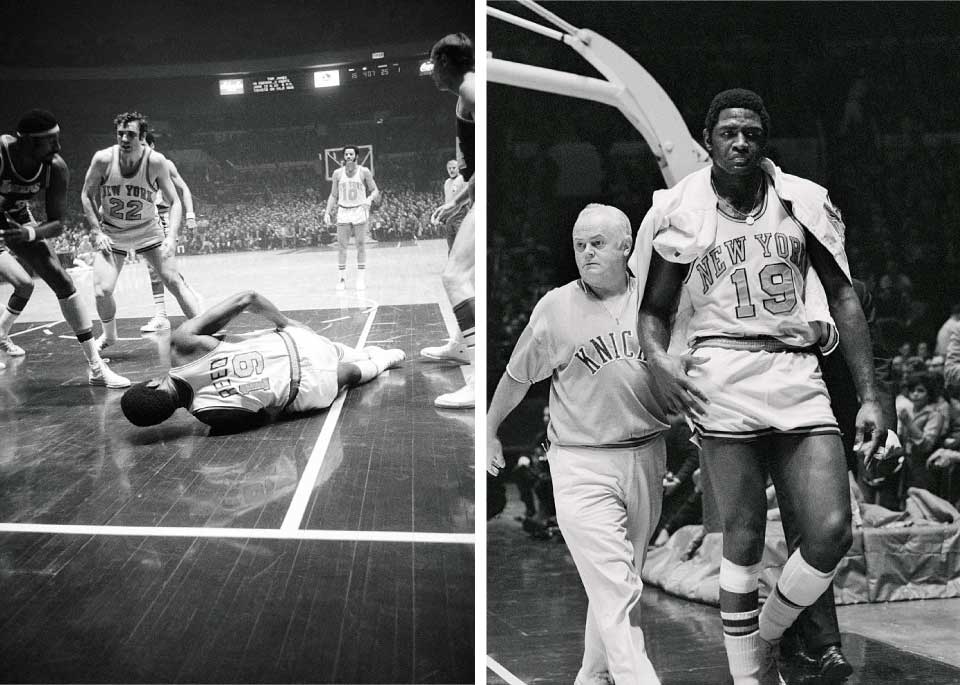“I’ve never heard the emotion of a crowd responding as greatly as that crowd responded to Willis Reed stepping on the floor,” recalled legendary coach Phil Jackson.
“The crowd became our sixth man,” said Reed teammate and Hall of Famer Walt Frazier. “They catapulted us to another level.”
To those younger than a Baby Boomer, you can be forgiven if it sounds like those comments (from an ESPN SportsCentury documentary) are describing an awe-inspiring, spiritual moment—but you wouldn’t be too far off.
It may come as a surprise that the player being worshipped for his heroics, Willis Reed, scored all of four points in the landmark game being recalled—the New York Knicks’ improbable victory over the dominant Los Angeles Lakers in Game 7 of the 1970 NBA championship series.
NOT ABOUT THE POINTS
On that historic night, though, it wasn’t about the number of points the Hall of Fame center scored for his team. It was about the shot of medicine he received before the game to numb his badly injured leg and the shot of adrenaline he gave the 20,000 Garden fans when he hobbled out after not being expected to play.
His four points were incidental to his real contribution: merely showing up in uniform, starting the game, and playing through the wincing pain.
As the above remarks make clear, it was all about the emotions surrounding the moment that has given it mythic status over the years.
Willis Reed epitomizes a sports hero of a bygone age. In his era—late ‘60s-early ‘70s—players didn’t jump from one team to another to score a fatter payday. They stayed loyal to the franchise that brought them up. His salary—a fraction of LeBron’s today—didn’t make headlines. His playing did. Money was not his motivation. Neither is it LeBron’s. For both players, it’s about pride, competitiveness, and work ethic. Just as it should be for anybody in any profession.
WHEN LOYALTY MEETS TRUST
Willis Reed is not the only past athlete whose game-time heroics are remembered decades later. I point to him because the strength of character he showed in that epiphany, when he put the team on his broad back, makes a great object lesson in loyalty and trust; his loyalty to his teammates and their fans, and the team’s and fans’ trust that his grit and pride would get the job done.
There are teams in business too. When I ran specialty apparel retailer rue21, I knew it was my job as CEO to instill loyalty and trust in our team. That’s a two-way street, of course. I had to show it to them to expect it in return. And I did. And they paid me back in a way that I treasure to this day. We had a great team that performed consistently at the highest levels, not unlike a championship sports team.
Another great example of loyalty and trust, also from 50 years back, is when flamboyant quarterback “Broadway Joe” Namath made headlines by brashly predicting his 18-point underdog New York Jets would beat the Baltimore Colts in the 1969 Super Bowl.
He wouldn’t have said that unless he trusted that his teammates could back up his boast. In return, they had to trust that he would deliver on game day. Their mutual trust and loyalty meant they weren’t going to let each other down.
Namath proved to be a brilliant motivator with his prediction. As a result, like Reed, he is revered to this day as a folk hero.
THE SUPERSTAR ERA
Today, the word more often heard than hero is “superstar.” but the words don’t feel the same. Like Hollywood stars, superstars have 24/7 media exposure.
Their sky-high profiles aside, though, today’s superstars are not worshipped the way yesterday’s heroes were. There was something more personal and organic about it then. Now, as with too many business relationships, with bosses, with colleagues, and with customers, everything is transactional. “What have you done for me lately?” determines what passes for “trust” and “loyalty.”
21st Century superstars seem to come and go, and rarely is the emotional attachment that fans feel the same as it is 50 years later for a Reed or a Namath. Unless something tragic happens…
FANS FOREVER, WIN OR LOSE
Fan loyalty can be a powerful emotion. Even without winning a title in 50 years, Knicks fans of all generations stick with their team. The same goes for fans of the Jets, also without a title in a half-century.
The fans stay connected and hopeful because they trust that “the best is yet to come.” That’s exactly what I tell Millennials who may grow impatient at a job or frustrated by a career setback—I think it’s the only way to live, whether it’s as a sports fan or a working professional. That’s why the sentiment is a big part of my book Fisch Tales: The Making of a Millennial Baby Boomer.
So, where have all the heroes gone? Not just in sports, but in business? Do you revere or resent your boss? Does he or she trust you? Are you loyal to the rest of your team? Do they trust you? Are you a superstar of the office?
Where I see trust sorely lacking is between the generations. Instead of “OK, Boomer” and “OK, Millennial” being said with sarcasm, we’d all be better off if they were said with mutual trust…
“OK, Boomer, I hear you.”
“OK, Millennial, I hear you, too.”
Only if we listen to and hear each other, without irony, will today’s younger generations feel they have the support and respect they need to become tomorrow’s business heroes. Or maybe even superstars.

